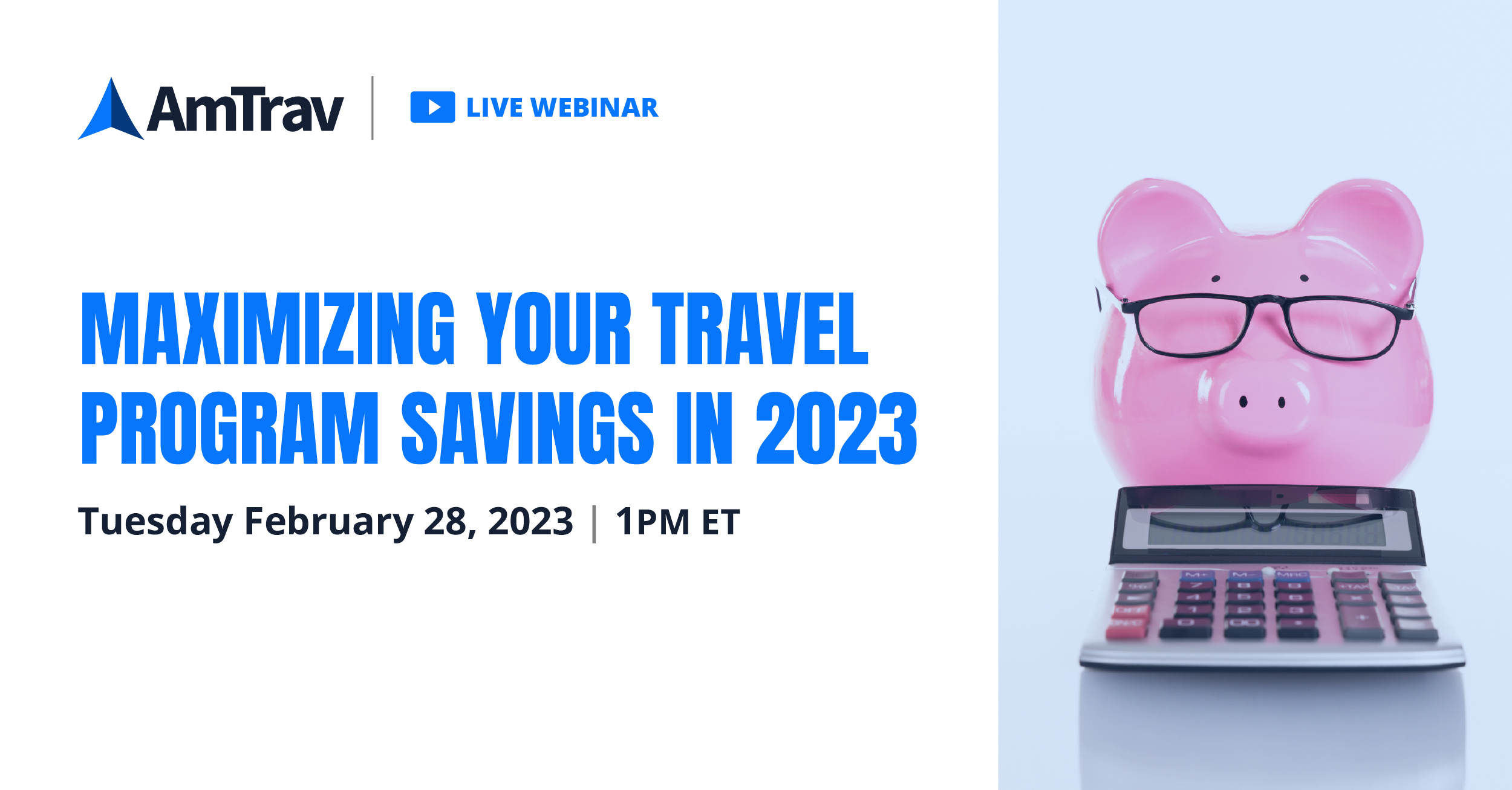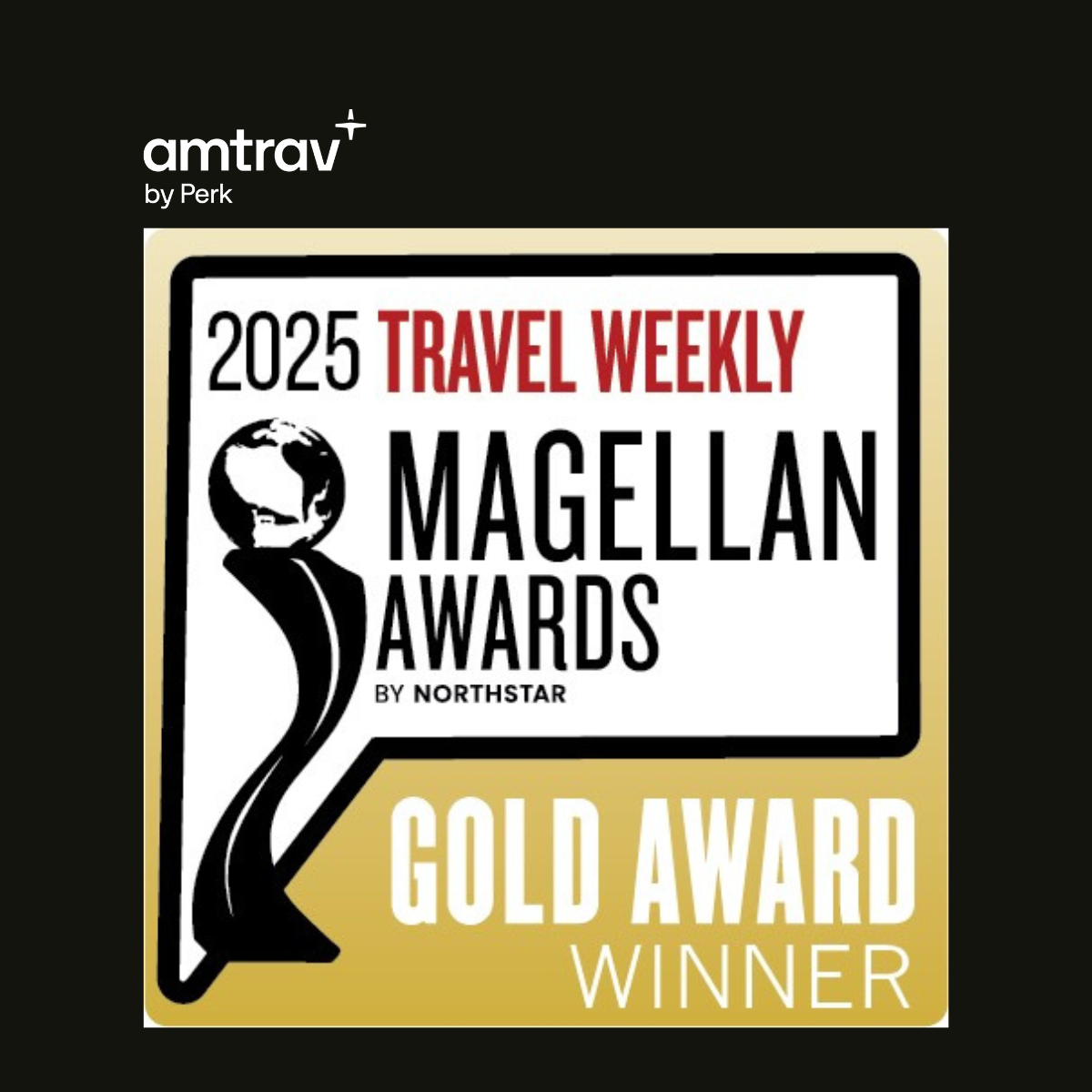On February 28th, 2023 AmTrav sat down with Travel and Compliance Analyst Christy Kanazawa of Avanos Medical and Jeff Houdek, CFO of Praying Pelican Missions, to discuss ways travel managers can truly maximize their savings, especially with AmTrav’s one-connected platform.
We’ve put several powerful webinars under our belts in the last few months, but this particular webinar was packed with actionable insights that could only be found by analyzing one billion airfares, which we did, with the sole purpose of saving you money.
You’re welcome. Let’s dig into some of the material we covered!
2023 Airfare Policy and Planning Insights
- Can you book too early? Yes. Prices go down until two months before departure.
- When studying advanced purchase, we found that 14 days before departure, the price jump was roughly 6%, and seven days before departure was 8%. Setting a policy around a 14-day advance purchase window is advisable, given the nature of your travel program, and reservations are not last minute (although some programs are)
- Interestingly the 14 to 13-day jump was 13% in 2020.
- Change fees, something you’ll never pay at AmTrav, are like lighting your budget on fire. Change happens. AmTrav saved customers over $5.7 Million in change fees in 2022 alone.
- Overall, advance purchasers save about 20% compared to those who don’t. So if it is something your program can do, do it.
- The day of booking does matter. Tuesday and Wednesday are reliably about 15% cheaper for airfares.
- The best month to travel overall is Feb., with the lowest fares. April and May are much cheaper than June-July, so there are savings if you can move your travel dates. And September and October are more affordable than the surrounding months by quite a bit.
Advanced Purchases
We broke down the data to tackle the heated debate around advanced purchases. How far out should you or travelers purchase your tickets? Should you set a policy around it?
Turns out, it does matter—quite a bit. If your program has the luxury of purchasing tickets in advance, we found that the sweet spot was around two months before departure.
Prices steadily decrease from about six months out until that two-month window, when they begin to increase.
When studying advanced purchase, we found that 14 days before departure, the price jump was roughly 6%, and seven days before departure was 8%. Setting a policy around a 14-day advance purchase window is advisable if your program can support it.
The difference between day 14 and day 13 can be as much as 13% (like in 2020), a sizable tax for procrastination. On average, advance purchasers save 20% compared to those who buy a week out or less.
Date of Purchase Savings
Another easy way to scoop up savings is to be intentional about which days travel is booked on. In our analysis, we found that buying a ticket on Tuesdays and Wednesdays averaged savings of about 15% in total. That adds up across a mid-sized organization.
And you’ll also want to plan your trips for cheaper months if the date isn’t necessary. This is because months like February, April, May, September, and October are much more affordable than their surrounding months.
The cheapest month for travel is in February overall.
Unused tickets
One of the easiest ways to save is to exchange your company’s unused ticket credits before they expire – it’s money you’ve already paid for a trip you didn’t take, and they’ll pass if you don’t apply them. It might sound self-explanatory, but you’d be surprised how often folks let these expire.Unused tickets are even more valuable now that you don’t have to pay $200 in change fees to redeem them on United, Delta, and American. There’s also lots of opportunity, with AmTrav currently holding more than $4 million in credits for clients.
For example, AmTrav clients saved 10% on airfare using their unused tickets, and 100 AmTrav clients saved more than 20%. It’s the biggest discount and savings opportunity, taking tickets that have already been paid and expensed, then using them to save on a new trip.
Here’s a quick breakdown by airline of how unused tickets work:
- American: Tickets are good for one year.
- Delta: Book by December 31, 2023, for travel by December 31, 2024.
- Southwest: Tickets issued on/after July 28, 2022, do not expire. Tickets before then are good for one year.
- United: Use by December 31, 2023, for travel starting by December 31, 2023.
- JetBlue and Alaska have no active ticket expiration date extensions.
Failing to take advantage of this tremendous savings opportunity is like setting a chunk of your budget on fire. Adhering to a strict policy regarding these tickets can prove to stakeholders that your program values efficiency.
The AmTrav Difference in Unused Tickets
Our Relationship Managers will strategize with you on your balances, helping you to find the best opportunities to use those tickets.
We’ll help you communicate to your travelers that unused tickets are available. You can even set a traveler’s profile to send email reminders of new tickets, so there’s never a missed opportunity.
We make it easy. AmTrav does this by automatically displaying tickets when the traveler searches, when the traveler purchases, and by letting them apply tickets with just one click at booking.
American Airlines Changes
It’s been in the works for a while, but American Airlines has been in the headlines lately about their “step back” from corporate travel. Regardless of how you view this shift, we must acknowledge several significant changes coming up (is our 2023 NDC Webinar ringing any bells?).
What’s changing?
- Spending required for corporate discount programs increased from $250K to $1.5M.
- This is a substantial figure. Unless your program is solely AA, you’ll need upwards of $5 million spent to qualify, depending on the share AA gets of your travel.
- Changes are expected to soft dollar programs used for name changes, waivers, and favors.
- Can no longer join or add funds to AirPass pre-funded corporate discount program.
- The lowest AA fares will only be available on AA.com (and app) and NDC-connected channels.
This forces the question on your program: do you need to focus more on American Airlines bookings, or do you need to shift priority?
Your program must commit more to American or potentially pull away to maximize your savings. Of course, this depends on your specific needs and goals, but it’s something to consider.
AmTrav has been preparing for NDC for the last 20 years, but not all solutions are created equal. SAP Concur has already expressed concerns that they may not be NDC-ready by the April deadline and will be missing out on specialized content and the lowest fares. And if your TMC provider (assuming you have one) isn’t NDC-enabled, what savings opportunities are you prepared to miss?
We can’t speak to Concur’s exact situation, but we can discuss ours. We’re ready.
Hotel Programs
The pandemic has uniquely hit hotels in lasting ways. First, they shut down altogether, then opened up to extreme cleaning standards, and finally, they’ve been trying to re-staff in a tight job market. That being said, there are still several ways to save.
Three types of savings: fixed rates that stay the same every night, percentage discounts off the best available rate, plus valuable perks like complimentary breakfast and free parking.
Overall AmTrav clients saved 7% in 2021, though that under-sells the opportunities as 110 accounts (some big, some smaller) held more than 10%.
How to realize these savings:
Check your data, and look for properties and areas your team frequently stays at – near your offices and facilities, client sites, etc.
Notice an opportunity or need some additional insight? Get ahold of your AmTrav Relationship Manager. We’re ready to help strategize, then negotiate and load your rates.
Finally, you can let your team know about your preferred hotels and why you stay there – what savings or perks they can get – and AmTrav will label and prioritize your preferred hotels to make savings easy for your team.
Car Rentals
Car rentals aren’t considered as often as other travel program components like hotel stays and airfares, but any travel manager worth their salt is looking for opportunities in this area. Below we’ve compiled some of our new data on car rentals to give you a glimpse into the savings.
The Details
- Car rental companies have faced shortages. Daily rates are 15% over 2019 levels.
- Save money and deal with shortages by securing preferred rental car agreements
- And encourage your travelers to sign up for rental car loyalty programs, skip the desk
Success in 2022:
- New data! AmTrav clients saved 29% on car rentals in 2022
- The ten largest AmTrav car programs averaged 38% savings, and 19 programs saved over 40%
- AmTrav will negotiate rates for you directly with rental car companies in these scenarios.
The Wrap Up
So, we’ve given you quite a bit of meat to chew on regarding maximizing your travel program savings. We hope you found this information insightful and actionable for your program’s needs.
Please reach out to us at sales@amtrav.com if you'd like to discuss ways to use these insights in your travel program today!
Admin




